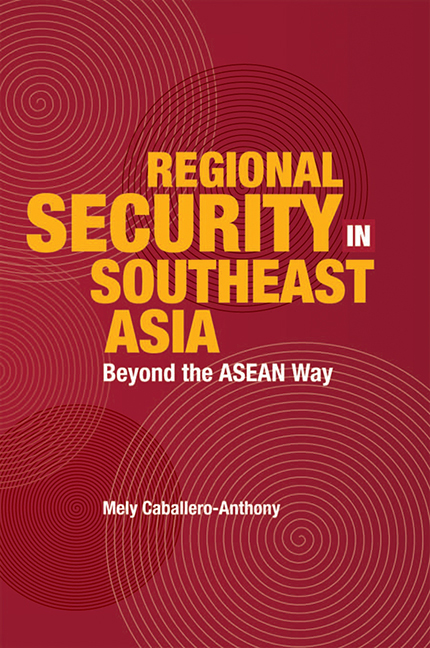Book contents
- Frontmatter
- Contents
- Acknowledgements
- INTRODUCTION: Regional Security in Southeast Asia: Beyond the ASEAN Way
- 1 Regionalism and Regional Security: Locating ASEAN
- 2 ASEAN's Mechanisms of Conflict Management: Revisiting the ASEAN Way
- 3 ASEAN and the Cambodian Conflict: Testing the Limits of the ASEAN Way
- 4 ASEAN Regional Forum: Extending the ASEAN Way in Managing Regional Order
- 5 ASEAN's Track Two Diplomacy: Reconstructing Regional Mechanisms of Conflict Management
- 6 The Asian Economic Crisis and Other Challenges: Turning Points Beyond the Comfort Zone?
- 7 ASEAN and Civil Society: Enhancing Regional Mechanisms for Managing Security
- 8 Conclusion: Beyond the ASEAN Way
- APPENDIX I Declaration of ASEAN Concord II (Bali Concord II)
- APPENDIX II Recommendations of the High-Level Task Force on ASEAN Economic Integration
- APPENDIX III ASEAN Vision 2020
- APPENDIX IV Declaration of ASEAN Concord
- Selected References and Further Readings
- Index
- About the Author
INTRODUCTION: Regional Security in Southeast Asia: Beyond the ASEAN Way
Published online by Cambridge University Press: 21 October 2015
- Frontmatter
- Contents
- Acknowledgements
- INTRODUCTION: Regional Security in Southeast Asia: Beyond the ASEAN Way
- 1 Regionalism and Regional Security: Locating ASEAN
- 2 ASEAN's Mechanisms of Conflict Management: Revisiting the ASEAN Way
- 3 ASEAN and the Cambodian Conflict: Testing the Limits of the ASEAN Way
- 4 ASEAN Regional Forum: Extending the ASEAN Way in Managing Regional Order
- 5 ASEAN's Track Two Diplomacy: Reconstructing Regional Mechanisms of Conflict Management
- 6 The Asian Economic Crisis and Other Challenges: Turning Points Beyond the Comfort Zone?
- 7 ASEAN and Civil Society: Enhancing Regional Mechanisms for Managing Security
- 8 Conclusion: Beyond the ASEAN Way
- APPENDIX I Declaration of ASEAN Concord II (Bali Concord II)
- APPENDIX II Recommendations of the High-Level Task Force on ASEAN Economic Integration
- APPENDIX III ASEAN Vision 2020
- APPENDIX IV Declaration of ASEAN Concord
- Selected References and Further Readings
- Index
- About the Author
Summary
Until the late 1990s, the Association of Southeast Asian Nations (ASEAN) had been described as one of the most successful regional organizations in the world. Founded in 1967 in a region that was once characterized as conflict-ridden and akin to the “Balkans of the East”, ASEAN's efforts in maintaining peaceful relations among its members and with states beyond Southeast Asia has made ASEAN an important actor in the bigger international arena of the Asia-Pacific. Moreover, at least until the Asian financial crisis in 1997, ASEAN was also one of the fastest developing economic regions in the world. This made ASEAN a pivotal actor in the much larger multilateral initiatives that emerged, which were geared towards closer political and security co-operation, as well as deeper economic co-operation. These multilateral initiatives include the Asia-Pacific Economic Co-operation (APEC, in 1989); the Asia Regional Forum (in 1994), Asia-Europe Meeting (ASEM, in 1995) and the ASEAN+3 (in 1997).
This relatively impressive story of ASEAN experienced a drastic twist in fortune when the Southeast Asian region went through a series of crises, starting from the onset of the Asian financial crisis in 1997. Since then, the organization came under closer scrutiny from scholars, policy-makers, members of the media, and casual observers who wrote about the unravelling of the ASEAN success story. The dramatic turn in the way ASEAN was characterized from a story of success to one of growing irrelevance pointed to the inefficacy of the organization to deal with new challenges and its adherence of old principles and norms. The latter, in particular, was cited by many ASEAN observers as a major stumbling block to ASEAN becoming a more dynamic organization and responsive to the call of the times.
Since the series of crises that have hit the region, the ambiguity in portraying ASEAN as a story of success or failure only deepened. To be sure, amidst a period of crises and rapid global changes, the complex tasks of objectively assessing ASEAN do not only lie with those who are telling the story and analysing events.
- Type
- Chapter
- Information
- Regional Security in Southeast AsiaBeyond the ASEAN Way, pp. 1 - 13Publisher: ISEAS–Yusof Ishak InstitutePrint publication year: 2005



